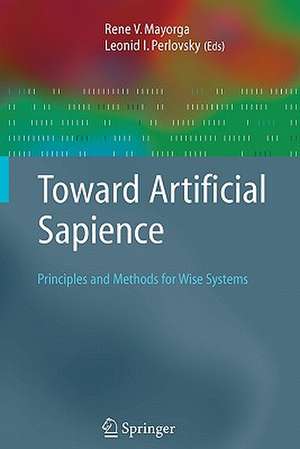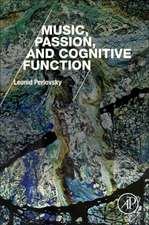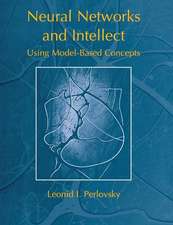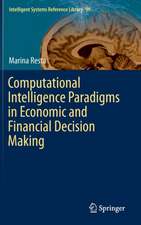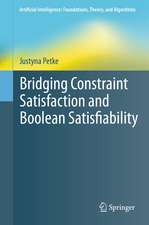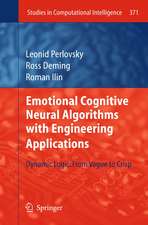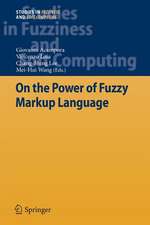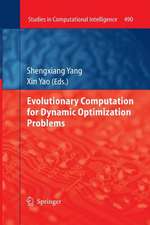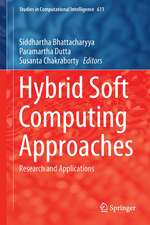Toward Artificial Sapience: Principles and Methods for Wise Systems
Editat de Rene V. Mayorga, Leonid Perlovskyen Limba Engleză Paperback – 13 oct 2010
Organised into seven sections so that the reader is guided through the subject in a structured and comprehensive manner
Concepts are formalized and extended, as well as compared and differentiated from their counterparts in the artificial intelligent and intelligence systems disciplines
Applicability of developed concepts are illustrated thoroughly
This novel state-of-the-art research volume is the first to explore computational sapience and sapient (wise) systems
Of utmost importance to all researchers and graduate students in the field
| Toate formatele și edițiile | Preț | Express |
|---|---|---|
| Paperback (1) | 643.63 lei 6-8 săpt. | |
| SPRINGER LONDON – 13 oct 2010 | 643.63 lei 6-8 săpt. | |
| Hardback (1) | 648.95 lei 6-8 săpt. | |
| SPRINGER LONDON – 6 dec 2007 | 648.95 lei 6-8 săpt. |
Preț: 643.63 lei
Preț vechi: 804.54 lei
-20% Nou
Puncte Express: 965
Preț estimativ în valută:
123.17€ • 127.86$ • 102.71£
123.17€ • 127.86$ • 102.71£
Carte tipărită la comandă
Livrare economică 22 martie-05 aprilie
Preluare comenzi: 021 569.72.76
Specificații
ISBN-13: 9781849966986
ISBN-10: 1849966982
Pagini: 260
Ilustrații: XVII, 239 p.
Dimensiuni: 155 x 235 x 14 mm
Greutate: 0.37 kg
Ediția:Softcover reprint of hardcover 1st ed. 2008
Editura: SPRINGER LONDON
Colecția Springer
Locul publicării:London, United Kingdom
ISBN-10: 1849966982
Pagini: 260
Ilustrații: XVII, 239 p.
Dimensiuni: 155 x 235 x 14 mm
Greutate: 0.37 kg
Ediția:Softcover reprint of hardcover 1st ed. 2008
Editura: SPRINGER LONDON
Colecția Springer
Locul publicării:London, United Kingdom
Public țintă
ResearchCuprins
Intelligence and Sapience.- Can Creativity Be Formalized? Peircean Reflections on the Role of Abduction in Human Intelligence.- On Plasticity, Complexity, and Sapient Systems.- Sapience, Consciousness, and the Knowledge Instinct (Prolegomena to a Physical Theory).- A Real-Time Agent System Perspective of Meaning and Sapience.- Sapient Agents.- Toward BDI Sapient Agents: Learning Intentionally.- TowardWisdom in Procedural Reasoning: DBI, not BDI.- Sapients in a Sandbox.- Sapient Agents – Seven Approaches.- Paradigms for Sapient Systems/Agents.- A Characterization of Sapient Agents.- A Paradigm for Sapient (Wise) Systems: Implementations, Design&Operation.- Bi-Sapient Structures for Intelligent Control.- Paradigms behind a Discussion on Artificial Intelligent/Smart Systems.- On the Development of Sapient systems.- Kinetics, Evolution, and Sapient Systems.- Emotions and Sapient Robots.- Scheme of an Abducing Brain-Based Robot.- From Robots with Self-Inhibiting Modules to Habile Robots.
Textul de pe ultima copertă
The current attempt to emulate human sapience (wisdom) by artificial means should be a step in the right direction beyond the Artificial/Computational Intelligence and Soft Computing disciplines, but is it warranted? Have humans achieved a level of modeling smart systems that justifies talking about sapience-wisdom?
This book presents computational paradigms describing lower- and higher-level cognitive functions, including mechanisms of concepts, instincts, emotions, situated behavior, language communication and social functioning. Hierarchical organization of the mind is considered, leading to explanations of the highest human capabilities for the beautiful and sublime. A diverse international set of authors discuss Artificial / Computational Sapience and Sapient Systems in this unique and useful volume.
The reader is guided through the subject in a structured and comprehensive manner, and begins with chapters discussing philosophical, historical, and semiotic ideas about what properties are expected from Sapient (Wise) systems. Following that, chapters describe mathematical and engineering views on sapience, relating these to philosophical, semiotic, cognitive, and neuro-biological perspectives.
Features and topics:
• Begins with a solid foundation, providing a detailed description of the fundamental concepts and principles of the topic
• Discusses concepts and current computational tools that enable the realization, implementation and design of a Sapient System concept
• Presents a brief history of the evolution and development of the artificial intelligence, computational intelligence and soft computing fields
• Concepts are formalized and extended, as well as compared and differentiated from their counterparts in the Artificial Intelligence and Intelligence Systems disciplines
• Explains potential applications of key concepts
• Contains discussions andsuggestions for future research
This novel, state-of-the-art research volume is the first to focus on and explore Artificial / Computational Sapience and Sapient (Wise) Systems. It will be of real utility to all researchers, graduate students, and professionals in the field who are interested in advancing beyond the usual topics on intelligent systems and artificial intelligence.
Dr Rene V. Mayorga is an Associate Professor in the Faculty of Engineering, at the University of Regina, Saskatchewan, Canada.
Dr Leonid I. Perlovsky is Visiting Scholar at Harvard University and Principal Research Physicist and Technical Advisor at the U.S. Air Force Research Laboratory/SNHE, Hanscom.
This book presents computational paradigms describing lower- and higher-level cognitive functions, including mechanisms of concepts, instincts, emotions, situated behavior, language communication and social functioning. Hierarchical organization of the mind is considered, leading to explanations of the highest human capabilities for the beautiful and sublime. A diverse international set of authors discuss Artificial / Computational Sapience and Sapient Systems in this unique and useful volume.
The reader is guided through the subject in a structured and comprehensive manner, and begins with chapters discussing philosophical, historical, and semiotic ideas about what properties are expected from Sapient (Wise) systems. Following that, chapters describe mathematical and engineering views on sapience, relating these to philosophical, semiotic, cognitive, and neuro-biological perspectives.
Features and topics:
• Begins with a solid foundation, providing a detailed description of the fundamental concepts and principles of the topic
• Discusses concepts and current computational tools that enable the realization, implementation and design of a Sapient System concept
• Presents a brief history of the evolution and development of the artificial intelligence, computational intelligence and soft computing fields
• Concepts are formalized and extended, as well as compared and differentiated from their counterparts in the Artificial Intelligence and Intelligence Systems disciplines
• Explains potential applications of key concepts
• Contains discussions andsuggestions for future research
This novel, state-of-the-art research volume is the first to focus on and explore Artificial / Computational Sapience and Sapient (Wise) Systems. It will be of real utility to all researchers, graduate students, and professionals in the field who are interested in advancing beyond the usual topics on intelligent systems and artificial intelligence.
Dr Rene V. Mayorga is an Associate Professor in the Faculty of Engineering, at the University of Regina, Saskatchewan, Canada.
Dr Leonid I. Perlovsky is Visiting Scholar at Harvard University and Principal Research Physicist and Technical Advisor at the U.S. Air Force Research Laboratory/SNHE, Hanscom.
Caracteristici
First scientific literature to focus on computational sapience and sapient (wise) systems
